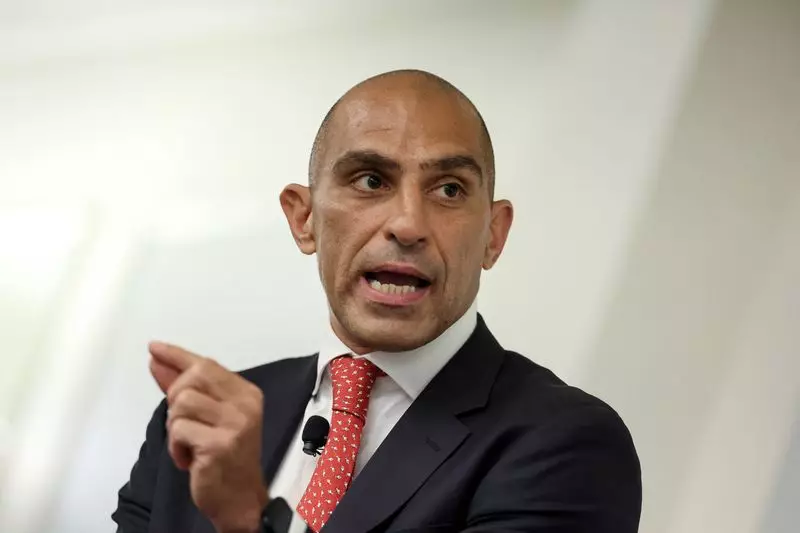As the political landscape of the United States prepares for a new chapter with the impending inauguration of Donald Trump, significant changes are on the horizon for regulatory bodies overseeing commodities and derivatives. With Rostin Behnam, the chair of the U.S. Commodity Futures Trading Commission (CFTC), announcing his departure on January 20, the industries under his watch must brace themselves for a potential pivot in regulatory philosophy. Behnam’s exit raises questions about the future direction of the CFTC, particularly in relation to cryptocurrency and political betting markets—domains that have seen starkly different regulatory approaches under his leadership compared to the previous chair.
Rostin Behnam’s time as chair of the CFTC has been marked by a cautious yet pragmatic approach toward emerging financial technologies and markets. Ascending to act chair in early 2021 and solidifying his position thereafter, Behnam guided the CFTC through a challenging environment characterized by rapid advancements in cryptocurrency and evolving market dynamics. His background as a senior counsel to Senator Debbie Stabenow, who is noted for her leadership on agricultural issues, has influenced Behnam’s perception of risk management and innovation within the sector.
Although Behnam adopted a comparatively lenient stance towards cryptocurrencies than that of other regulators, such as Gary Gensler at the SEC, he faced significant challenges. Notably, under his tenure, the CFTC enforced punitive measures against major exchanges, including a landmark case against Binance for anti-money laundering violations, which underscored the agency’s regulatory reach despite its softer stance.
Behnam’s resignation opens the door for Donald Trump to appoint a new chair, likely from among the CFTC’s Republican commissioners, such as Summer Mersinger or Caroline Pham. This expected shift signals a potential alignment with Trump’s deregulatory goals. The appointment of a chair who may lean more favorably toward industry self-regulation could bring about significant changes in how the CFTC approaches digital assets and their regulatory frameworks.
The transition team is also considering external candidates for the permanent chair role, highlighting the potential for fresh perspectives. As the CFTC gears up for a new leadership dynamic, it is essential to weigh the possible repercussions this change may have on the broader financial landscape, particularly for sectors like cryptocurrency that remain in a regulatory gray area.
During his tenure, Behnam pointedly addressed the inadequate regulatory framework surrounding the cryptocurrency market. He emphasized the importance of filling the regulatory gaps that have left large segments of the digital asset space unregulated. This perspective resonates profoundly in light of the heightened focus from regulators and law enforcement agencies to cultivate a more transparent and accountable marketplace.
Behnam expressed concerns about the legality of certain crypto operations and the urgency of implementing cohesive regulations. As he departs, the question remains whether the incoming chair will prioritize regulatory clarity within the cryptocurrency sector or adopt a more laissez-faire approach that may further complicate compliance for emerging businesses.
Beyond cryptocurrencies, Behnam’s term was noteworthy for its complex handling of event contracts, particularly in political betting. His resistance to allowing derivatives related to political outcomes sparked debates on legality and ethics, illustrating the blurry lines between gambling and legal wagers in political contexts. While a court ruling favored the marketplace Kalshi, permitting political event derivatives, Behnam cautioned against the societal implications of such betting practices. His departure may shift the regulatory stance, possibly increasing the acceptance of these products as the demand for election-related betting continues to grow.
Behnam’s focus extended beyond digital assets to encompass broader issues such as climate risk. Under his leadership, the CFTC unveiled guidelines for trading voluntary carbon credit derivative contracts. This move not only reflects a proactive approach to sustainability but also positions the CFTC as a key player in fostering confidence and innovation in the evolving market for environmental financial instruments.
Rostin Behnam’s resignation signals a pivotal moment for the CFTC as it braces for a leadership change that may redefine its regulatory posture. With an incoming chair who could alter the course of oversight for both cryptocurrencies and political betting, the financial markets must remain vigilant. As regulatory philosophies shift, the impact on innovation, market confidence, and compliance will be significant. The CFTC stands at a crossroads, and the decisions made in the coming months will largely determine the landscape of U.S. financial regulation for years to come.

